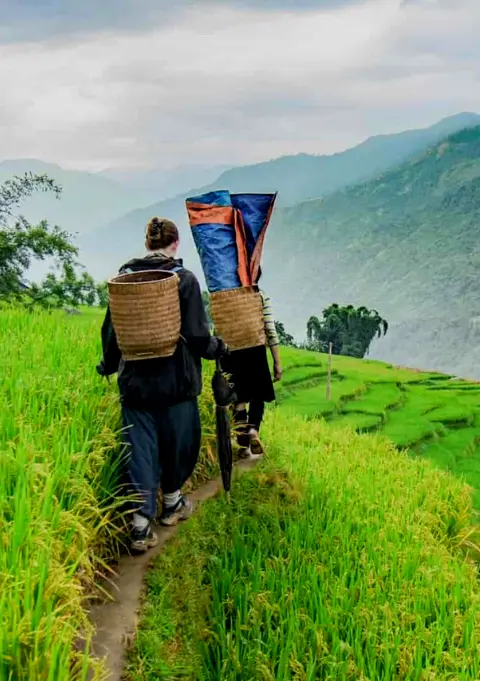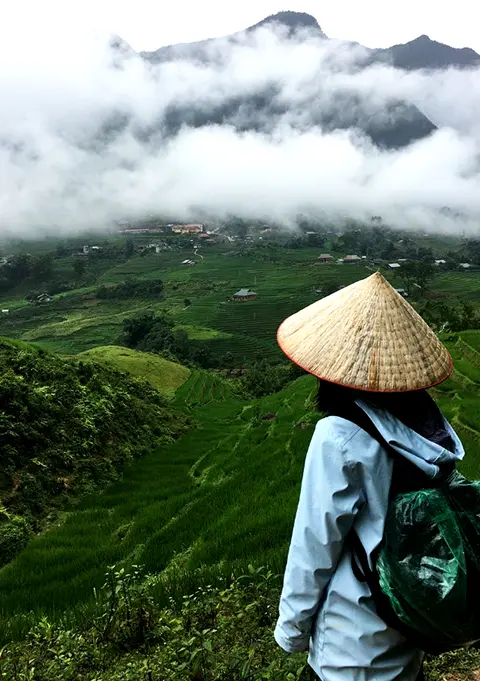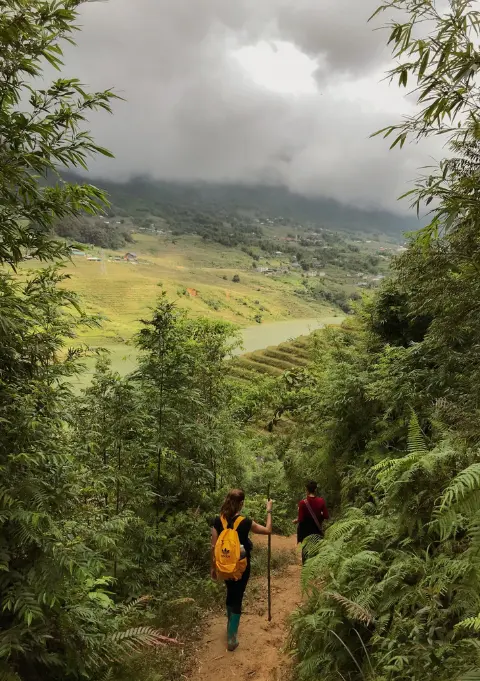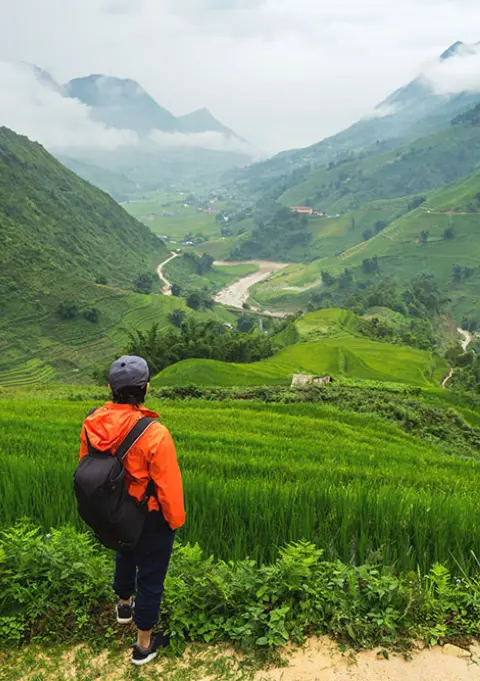As the famous adage goes, “Life is like a cup of tea, it’s all in how you make it.” And if you’re looking for an experience that will add depth and flavor to your life, exploring Sapa‘s tea plantations and tasting rooms should be at the top of your bucket list.

Nestled in the mountains of northern Vietnam, Sapa boasts a rich history and culture when it comes to tea production. From guided tours of sprawling plantations to sampling some of the world’s finest teas in rustic tasting rooms, this region has something for every tea lover. Get ready to immerse yourself in the beauty and sustainability of Sapa’s tea industry while savoring each sip with newfound appreciation.
Table of Contents
ToggleHistory of Sapa’s Tea Industry
If you’re curious about how Sapa’s tea industry came to be, you’ll want to learn about the fascinating history outlined in this section. The tea production methods used in Sapa date back hundreds of years and were originally brought over from China. In the early 20th century, French colonizers established tea plantations in the region and introduced new techniques for cultivating and processing tea leaves.

Today, Sapa’s tea industry has been impacted by a rise in tourism as visitors come to explore the beautiful landscapes and taste locally grown teas. The increase in demand has led to an expansion of tea plantations and an emphasis on sustainable farming practices. As you delve further into exploring Sapa‘s tea scene, it’s important to understand the rich history that has shaped this unique industry.
Guided Tours of Tea Plantations
Join us for a guided tour through the lush green fields where you’ll learn about the history and process of creating one of the world’s most beloved beverages. As you walk through Sapa‘s tea plantations, experienced guides will explain the tea-picking techniques used by local farmers, as well as share with you some of their rich tea traditions. You’ll get a first-hand look at how tea leaves are harvested and processed before being transformed into your favorite cuppa.

During the tour, you’ll have an opportunity to visit tasting rooms where you can sample various teas produced in Sapa. From earthy green teas to floral oolongs, there is something for every palate. The knowledgeable guides will explain each variety’s unique flavor notes and health benefits, giving you a deeper appreciation for this ancient beverage. After this experience, you might gain a newfound love for tea! Let’s move on to our next section where we delve further into the different types of teas found in Sapa.
Tea Varieties
Let’s take a closer look at the various types of teas grown and harvested in this region, including the fact that over 70% of tea produced in Sapa is green tea. Green tea is known for its high antioxidant content, which provides numerous health benefits such as reducing inflammation and improving brain function. On the other hand, Oolong tea is partially fermented, giving it a unique taste and aroma that varies depending on the degree of fermentation. While it may not have as many health benefits as green tea, oolong is known for aiding digestion and promoting weight loss.

To help you understand each type better, here’s a Tea Variety Comparison table:
| Type | Flavor Profile | Health Benefits |
|---|---|---|
| Green | Delicate & grassy | Reduces inflammation |
| Oolong | Floral & fruity | Aids digestion & promotes weight loss |
| Black | Bold & strong | Lowers risk of heart disease |
| White | Subtle & sweet | Rich in antioxidants |
When visiting Sapa‘s tea plantations and tasting rooms, be sure to try different varieties to find your preferred flavor profile. Additionally, consider Tea Pairings by matching your favorite varieties with food and desserts – for example, pairing black tea with chocolate or white tea with fruit tarts. With so many options available in this region alone, you’re sure to find your perfect cup of tea. Next up: exploring Sapa’s Tea Tasting Rooms!
Sapa 1 Day Tours

- 1 day experience
- Moderate to challenging
- Cultural immersion & active adventure
- Rice fields, valleys & villages
- Private tours
- Vegan-friendly
Sapa 2 Day Tours

- 2 days 1 night experience
- Moderate to challenging
- Cultural immersion & active adventure
- Mountains, valleys, rice fields and villages
- Private tours
- Vegan-friendly
Sapa 3 Day Tours

- 3 days 2 night experience
- Moderate to challenging
- Cultural immersion & active adventure
- Mountains, valley, rice fields & villages
- Private tours
- Vegan-friendly
Sapa 4 Day Tours

- 4 days 3 night experience
- Moderate to challenging
- Cultural immersion & active adventure
- Mountains, valleys, rice fields & villages
- Private tours – Less Touristic
- Vegan-friendly
Tasting Rooms
You’ll find yourself immersed in a delightful sensory experience as you step into the cozy, quaint spaces of Sapa‘s tea-tasting rooms. These tasting rooms are an ideal place to sample a variety of teas and learn about the different flavors and aromas that make each one unique. As you take your seat, you’ll be greeted by a knowledgeable tea expert who will guide you through the tasting process.

Tea pairing is an important aspect of local cuisine in Sapa, and these tastings provide an opportunity to discover which teas complement certain dishes. During your visit, you might taste green tea paired with steamed rice or black tea paired with savory meats. You’ll also have the chance to try teas infused with local herbs and spices, such as ginger or lemongrass. A visit to one of Sapa’s tea-tasting rooms is not only a chance to indulge in delicious teas but also an opportunity to learn about the rich culture behind this beloved beverage.
Sapa 1 Day Tours

- 1 day experience
- Moderate to challenging
- Cultural immersion & active adventure
- Rice fields, valleys & villages
- Private tours
- Vegan-friendly
Sapa 2 Day Tours

- 2 days 1 night experience
- Moderate to challenging
- Cultural immersion & active adventure
- Mountains, valleys, rice fields and villages
- Private tours
- Vegan-friendly
Sapa 3 Day Tours

- 3 days 2 night experience
- Moderate to challenging
- Cultural immersion & active adventure
- Mountains, valley, rice fields & villages
- Private tours
- Vegan-friendly
Sapa 4 Day Tours

- 4 days 3 night experience
- Moderate to challenging
- Cultural immersion & active adventure
- Mountains, valleys, rice fields & villages
- Private tours – Less Touristic
- Vegan-friendly
Tea Culture in Sapa
If you’re interested in experiencing the traditional tea culture of Sapa, then attending a tea ceremony is a must. These ceremonies are deeply rooted in local customs and provide an opportunity to learn about the history and significance of tea in Vietnamese culture. Additionally, participating in one of Sapa’s many tea festivals can be a fun way to taste new teas, meet locals, and immerse yourself in the vibrant community spirit of this unique region.
Traditional Tea Ceremonies
You’re in for a treat as the next section delves into the intricate and fascinating world of traditional tea ceremonies. In Sapa, tea has always been more than just a beverage; it’s an art form that requires precision, knowledge, and impeccable manners. Tea brewing techniques vary depending on the type of tea used, its quality, and even the season.

Tea etiquette and manners are also an essential part of traditional tea ceremonies. Before serving the tea, guests must first bow to each other as a sign of respect. The host will then use specific utensils to prepare and serve the tea in small porcelain cups. Guests should only take a sip or two at a time and hold their cups with both hands as a sign of gratitude towards the host. The whole process can take up to several hours but is well worth it for those who appreciate this ancient ritual. As you can see, drinking tea in Sapa is much more than just sipping some hot water with leaves; it’s an experience full of traditions and customs that have been passed down through generations.
Now that you’ve learned about traditional tea ceremonies let’s move on to another exciting topic: Tea Festivals!
Sapa 1 Day Tours

- 1 day experience
- Moderate to challenging
- Cultural immersion & active adventure
- Rice fields, valleys & villages
- Private tours
- Vegan-friendly
Sapa 2 Day Tours

- 2 days 1 night experience
- Moderate to challenging
- Cultural immersion & active adventure
- Mountains, valleys, rice fields and villages
- Private tours
- Vegan-friendly
Sapa 3 Day Tours

- 3 days 2 night experience
- Moderate to challenging
- Cultural immersion & active adventure
- Mountains, valley, rice fields & villages
- Private tours
- Vegan-friendly
Sapa 4 Day Tours

- 4 days 3 night experience
- Moderate to challenging
- Cultural immersion & active adventure
- Mountains, valleys, rice fields & villages
- Private tours – Less Touristic
- Vegan-friendly
Tea Festivals
If you’re a tea lover, then you’ll love attending the various tea festivals held in Sapa. These events celebrate the region’s rich tea culture and offer an opportunity to sample different types of local teas. You can also try out tea pairing menus, which pair different teas with food items like biscuits or cakes.

At these festivals, you’ll get a chance to meet local tea artisans who work hard to create unique blends of teas. They will share their knowledge on how they grow and harvest the leaves, as well as how they blend them to create flavorful and aromatic teas. You can even participate in interactive workshops to learn about the brewing process and other fascinating facts about tea production. Overall, it’s a great way to immerse yourself in Sapa‘s vibrant tea culture while enjoying some delicious brews.
Sapa 1 Day Tours

- 1 day experience
- Moderate to challenging
- Cultural immersion & active adventure
- Rice fields, valleys & villages
- Private tours
- Vegan-friendly
Sapa 2 Day Tours

- 2 days 1 night experience
- Moderate to challenging
- Cultural immersion & active adventure
- Mountains, valleys, rice fields and villages
- Private tours
- Vegan-friendly
Sapa 3 Day Tours

- 3 days 2 night experience
- Moderate to challenging
- Cultural immersion & active adventure
- Mountains, valley, rice fields & villages
- Private tours
- Vegan-friendly
Sapa 4 Day Tours

- 4 days 3 night experience
- Moderate to challenging
- Cultural immersion & active adventure
- Mountains, valleys, rice fields & villages
- Private tours – Less Touristic
- Vegan-friendly
As we move forward into exploring sustainability and fair trade practices associated with Sapa‘s tea plantations, it’s important to recognize that attending these festivals supports local communities by promoting their products and livelihoods. By buying locally-produced teas instead of imported ones, we help sustain small-scale agriculture and reduce our carbon footprint by reducing transportation emissions. Additionally, supporting fair-trade practices ensures that farmers receive fair compensation for their hard work while protecting the environment from harmful pesticides or fertilizers often used in large-scale operations. So let’s continue our journey through Sapa’s beautiful landscape while actively contributing towards its sustainable development!
Sustainability and Fair Trade Practices
When it comes to sustainability and fair trade practices, you’ll be pleased to know that the tea industry in this region has made great strides in recent years. Here are some reasons why:
- The tea plantations in Sapa have adopted eco-friendly packaging for their products, reducing waste and promoting sustainability.
- Ethical sourcing practices are now the norm in these plantations, ensuring that farmers receive fair compensation for their work.
- Local communities benefit from these sustainable practices as well, with increased job opportunities and income generation.
- Tourists are encouraged to support these efforts by choosing tea brands that prioritize ethical and sustainable production.

With all these positive developments, it’s no wonder that exploring Sapa’s tea plantations is not just a delightful experience but also an opportunity to contribute positively to the local economy. So if you’re planning your visit to Sapa‘s tea plantations and tasting rooms, read on for some tips on how to make the most out of your trip.
Planning Your Visit to Sapa’s Tea Plantations and Tasting Rooms
Ready to embark on a journey that will tantalize your taste buds and invigorate your senses? Planning your visit to Sapa’s tea plantations and tasting rooms is an essential step in ensuring a smooth, enjoyable experience. When it comes to transportation options, there are several choices available. You can opt for private transfers or choose public transport like buses and trains. If you’re traveling from Hanoi, the best option is to take the overnight sleeper train which offers comfortable beds and stunning views of the countryside.

As for accommodation choices, Sapa has plenty of options ranging from budget-friendly hostels to luxurious resorts. Staying at one of the many homestays in the area is highly recommended if you want an authentic experience. Not only will you be able to learn more about the local culture but also get insights into how tea is produced by visiting nearby plantations. Once you’ve decided on your transport and accommodation options, it’s time to explore Sapa’s tea plantations and tasting rooms!
Exploring Sapa’s Tea Plantations And Tasting Rooms Frequently Asked Questions
What is the average price range for tea sold in Sapa’s tasting rooms?
When it comes to tea varieties sold by local vendors in Sapa’s tasting rooms, the average price range can vary depending on factors such as quality and rarity. However, generally speaking, you can expect to find teas ranging from $5-$20 per 50g. Some of the more common varieties like black and green tea may fall towards the lower end of that spectrum while more specialty blends or rare teas could push toward the higher end. Regardless of your preference, sampling teas from different vendors is a great way to explore the flavors unique to this region and support local businesses at the same time.
Are there any tea-related festivals or events that take place in Sapa throughout the year?
You may be wondering if there are any tea-related festivals or events that take place in Sapa throughout the year. Well, you’re in luck! Sapa is home to many cultural traditions, including several tea-related festivals and events. One such festival is the Sapa Tea Festival, which takes place annually and celebrates all things tea. The festival features traditional tea ceremonies, performances by local musicians and dancers, and even a tea-picking competition. Other events include workshops on how to brew the perfect cup of tea and tours of local tea plantations. Whether you’re a die-hard tea lover or just looking for something new to experience, Sapa’s tea-related festivals are not to be missed!
Can visitors participate in the tea harvesting process during their guided tours?
Want to immerse yourself in the local tea culture and have a unique experience during your trip to Sapa? Consider participating in a tea harvesting experience! Many guided tours offer visitors the opportunity to get their hands dirty and pick tea leaves alongside local farmers. Not only will you learn about the traditional harvesting methods, but you’ll also gain insight into the importance of tea in Vietnamese culture. This activity is perfect for those who desire freedom from typical tourist activities and want to truly connect with the destination they are visiting. Don’t miss out on this chance to be a part of something special during your time in Sapa!
Are there any traditional tea ceremonies that visitors can witness or participate in while in Sapa?
Immerse yourself in the rich cultural significance of traditional tea making during your visit to Sapa. Witness or even participate in a tea ceremony, where every step is steeped in history and meaning. The process involves carefully selecting and preparing the tea leaves, heating water to the perfect temperature, and serving the tea with great respect for its significance. As you sip on a warm cup of perfectly brewed tea, you’ll feel a sense of connection to the land and its people that will stay with you long after your trip has ended.
How has the tea industry in Sapa been affected by modernization and globalization?
The tea industry in Sapa has gone through significant changes due to modernization and globalization. The impact of technology has allowed farmers to produce tea more efficiently, but it has also led to the loss of traditional farming practices. Sustainability practices are becoming increasingly important as consumers demand eco-friendly products, and some tea producers in Sapa have started implementing these practices. However, there is still a long way to go for the industry to become completely sustainable. As a visitor, you can witness firsthand how the tea industry is adapting to these changes while exploring Sapa’s Tea Plantations and Tasting Rooms.
Conclusion
Now that you have explored Sapa’s tea plantations and tasting rooms, you can truly say that you have experienced the heart of Vietnam’s tea industry. The history, culture, and sustainability practices surrounding this age-old tradition are not only fascinating but also essential to understand as a responsible traveler. Walking through the lush green fields of the plantation while sipping on some freshly brewed tea is like walking through a dreamy painting where each stroke captures the beauty of nature.
You have gained insight into different varieties of tea and tasted their unique flavors in cozy tasting rooms. You have learned about how locals harvest tea leaves with utmost care to maintain quality and sustainability. As you leave Sapa, take these memories with you as a reminder of the intricacies that make up Vietnam’s rich cultural tapestry. Remember to continue supporting fair trade practices by choosing ethically sourced teas whenever possible so that this beautiful tradition can thrive for generations to come.
Sapa 1 Day Tours

- 1 day experience
- Moderate to challenging
- Cultural immersion & active adventure
- Rice fields, valleys & villages
- Private tours
- Vegan-friendly
Sapa 2 Day Tours

- 2 days 1 night experience
- Moderate to challenging
- Cultural immersion & active adventure
- Mountains, valleys, rice fields and villages
- Private tours
- Vegan-friendly
Sapa 3 Day Tours

- 3 days 2 night experience
- Moderate to challenging
- Cultural immersion & active adventure
- Mountains, valley, rice fields & villages
- Private tours
- Vegan-friendly
Sapa 4 Day Tours

- 4 days 3 night experience
- Moderate to challenging
- Cultural immersion & active adventure
- Mountains, valleys, rice fields & villages
- Private tours – Less Touristic
- Vegan-friendly





